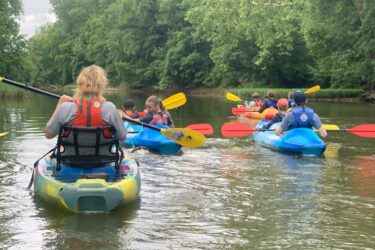You are considering a summer camp for your child, but how to choose the one that will be the best experience?
 There’s a camp that is ideally suited for every child, providing a summer of growth and fun whether your child attends a day or overnight camp, a specialized or traditional camp.
There’s a camp that is ideally suited for every child, providing a summer of growth and fun whether your child attends a day or overnight camp, a specialized or traditional camp.
With help from the professionals at the American Camp Association (ACA), here’s some sound advice to help you sort through the choices and benefits that camp delivers. As spring approaches, you and your children can look forward to planning for the future – a future that includes the opportunities for exploration and discovery that arrives with summer camp.
How to Decide Your Child’s Camp Readiness
Children are ready for new experiences at different stages. Parents know their children best and the following questions can help gauge whether this is the summer your child should start camp.
What is your child’s age? Children younger than 7 may not adjust easily to being away from home. Consider the day camp experience to prepare them for future overnight camp.
How did your child become interested in camp? Does your child talk about camp on a sustained basis? How much persuasion is necessary from you?
Has your child had positive overnight experiences away from home? Visiting relatives or friends? Were these separations easy or difficult?
What does your child expect to do at camp? Learning about the camp experience ahead of time allows you to create positive expectations.
Are you able to share consistent and positive messages about camp? Your confidence in a positive experience will be contagious.
A Camp for Every Child – The Perfect Fit
Camp can last for just a few days or stretch to all summer long. It’s well worth the time to investigate the variety of choices offered by camps before your child packs a backpack. These questions help you consider the options:
Near or Far?
Where do you want your child to go to camp? Locally or far away? While each camp experience has something unique to offer your child, this is an opportunity for families to assess what they value for their campers.
Benefits of a Camp Nearby
- Easier to evaluate and visit
- Friends and family are likely familiar with camp
- Minimal travel costs
- Likely contact with classmates or children from same region
Benefits of a Camp Far Away
- More choices
- Different experiences, different geography, e.g., mountains or oceans – even different languages
- Promotes independence, particularly for early and late adolescent campers
- Diversity of campers
- Chance for family to visit and vacation at close of camp
Session Length Offers Another Choice
Camps offer widely varying options to help parents and children reach their goals for summer fun and exploration. Talking with your child about the goals you both share helps determine which choice is right for you.
Benefits of Short Sessions
(one to three weeks)
- First-time or younger campers have a chance to learn new skills
- Bonds develop with other campers and staff
- Great exposure to camp experience with less expense
- Minimizes homesickness
Benefits of Longer Sessions (four to 12 weeks)
- Strong sense of belonging to camp community
- Chance to learn new skills
- Development of specialized skills
- Multiple opportunities for learning and enrichment
- Lifelong friendships
- Opportunities to contribute to camp culture
Boys Only, Girls Only or Co-ed?
Now may be the opportunity to explore the choices and benefits of all boys, all girls or co-ed camps.
Benefits of Single-Sex Camps
- Breaking gender stereotypes – girls interact with women in positions of authority and boys interact with men who act as nurturers
- More opportunities for kids to be themselves without impressing or competing with the opposite sex
- Camp philosophy may be tuned into gender strengths and weaknesses
- Brother or sister camps may share activities
Benefits of Co-ed Camps
- Mirrors and prepares campers for everyday living in a co-ed world
- Allows families with a boy and a girl to attend the same camp
- Offers diverse points of view
- Breaks through rigid divisions set up in school when campers participate on equal footing
A Camp for Every Child – Traditional, Specialty and Special Needs
Choices abound when it comes to camp programs. One may highlight a wide variety of activities geared to campers of all ages and skill levels; others, because of their setting and expertise, may concentrate on one or two activities while providing traditional activities as well. Parents of special needs children are pleased to learn about the range of camp activities that help kids be kids first.
Benefits of Traditional Camps
- Wide variety of activities
- Chance for campers to try new activities
- Exposure to more campers and staff at varying activities
Benefits of Specialty Camps
- One or two specialized activities (often combined with traditional offerings)
- Expectation for increased proficiency during camping session
- Deepens knowledge and skill in particular area of interest or ability
Benefits of Special Needs Camps
- Activities geared to campers’ abilities
- Knowledgeable staff with expertise to understand campers’ strengths and challenges
- Supportive and fun atmosphere to share with others
The Value of Camp for Every Child
What happens when you make the decision to choose camp? You open up a world of discovery and learning for your child, a world that values children for who they are and who they will become. Camp gives each child a world of good.
the bottom line about camp costs
You know that camp is an experience that will last a lifetime. However, you may worry about the cost, especially if there is more than one camp-aged child in your house. The good news is there is a camp for just about every budget. While fees to attend camp vary, they can range from $75 to more than $650 per week for American Camp Association-accredited resident and day camps.
Parents may also reduce the costs by asking the right questions. When talking with the camp director, parents should ask the following:
What is the refund policy?
Refund policies vary greatly from camp to camp. Some refund for illness only, some will give a total refund prior to a certain date and some do not refund at all. Most camps will ask for a small non-refundable deposit at the time of application, which may or may not go toward the cost of tuition. It is important to know the refund policy before you send any money.
Is financial assistance available?
Many camps offer camperships, which is a partial or total subsidy of the tuition costs, but parents need to ask if they are available. Although they are usually awarded based on need, do not assume that you make too much to qualify. It is important to apply early.
What does tuition include?
Day camps will typically include transportation as part of their tuition. Resident camps may offer limited transportation, such as a van ride from a major local train station. Other amenities to ask about are fees for special programs and trips, laundry service, camp canteen, special equipment that is required and service organization membership. Also, ask the camp director if it is appropriate to send spending money with your child.
Are special discounts available?
Often, camps will offer special discounts for such things as early registration, full-season enrollment and enrollment of multiple family members. If more than one special discount applies, parents may only be able to take advantage of one.
Founded in 1910, the American Camp Association is a national community of camp professionals and is dedicated to enriching the lives of children and adults through the camp experience. The ACA camp database provides parents with many ways to find the ideal ACA-accredited camp. For more information, visit ACA’s family-dedicated Web site, www.campparents.org.
Source: American Camp Association




